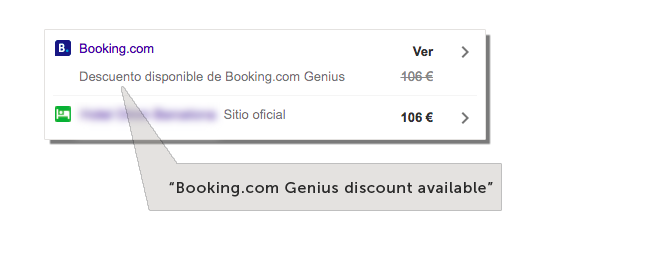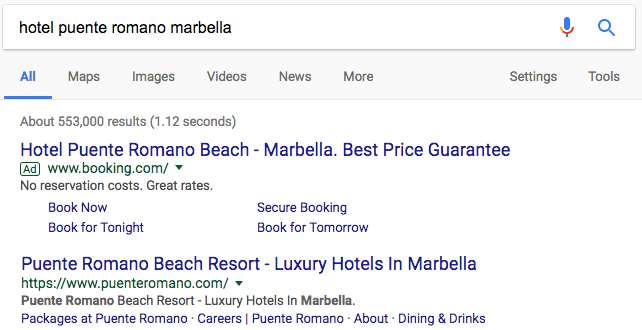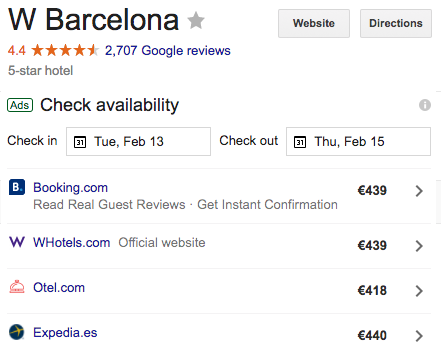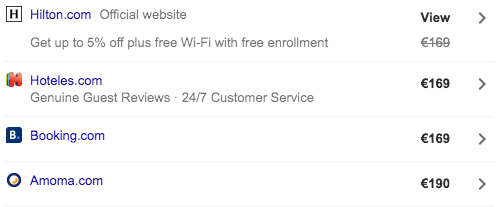With barely any opposition from hotels, Booking.com is taking big steps to continue growing and capturing sales for your hotel which are currently coming in through other channels, including your own website. Get ready, whether you like it or not, to see your Genius rates on metasearch engines.
Why and to whom do you pay commissions?
As a hotelier, you are ready to pay a commission so that Booking.com -or any other channel- generates new sales for you. In other words, it captures clients that you otherwise would not have been able to attract to your hotel. The conflict arises when a sale generated somewhere else -”client who chooses your hotel whilst browsing on TripAdvisor” or “friend who recommends your hotel to someone else”- ends up on Booking.com and you end up paying a commission that you shouldn’t have.
The classic example of searching for your hotel name on Google, where intermediation generates no value, but it refuses to be withdrawn despite you wanting it to. It’s a lost battle that some hotel chains are starting to bounce back from.
More recently, OTAs also won the battle of metasearch engines, where once again they bid on your name without offering the option of withdrawing it despite you begging for it.
Their response towards your pleas is “it’s in the contract”, although they may sugar-coat it with other banal and nonsensical reasons which deter or confuse many hoteliers.
At the end of the day, if I were Booking.com, I wouldn’t remove my advertisements for your name on AdWords or on metasearch engines. Doing so would result in a decline in my sales of between 30% and 50%, so why do it? What would I gain in exchange?
Booking Genius
A few years ago, Booking.com launched its Booking Genius programme to build customer loyalty among its clients -with you picking up the tab, of course-. It was a brilliant move with some short-term attractions but incredibly negative consequences in the long run. It’s a “slow-motion suicide” which, at Mirai, we openly recommend that you leave Genius before it’s too late.
For those hotels which are still in Genius, hold on tight because it’s going to be a bumpy ride.
Genius rates on metasearch engines
The Genius programme was aimed at “increasing your hotel’s visibility before users identified as more valuable in exchange for a 10% discount”.
Forget about that concept because there is news on the matter. From what we’ve seen in the last few weeks, Booking.com has started to publish your Genius rates (exclusive and the most competitive ones) on metasearch engines and, therefore, outside Booking.com.
For now, we have only found Genius rates inside Google Hotel Ads -and only sometimes, a sign that they’re still experimenting with the idea-, but having seen this, it wouldn’t surprise us to see them on TripAdvisor or Trivago shortly.
Does your hotel gain anything from all of this?
Giving away an exclusive discount in exchange for gaining visibility within the Booking.com list and for this rate to end up in metasearch engines competing with other channels where your own website could be… Does it make sense? Who does it benefit?
Up until now, the Genius “damage” was limited. That favourable treatment was limited to discriminating users inside the Booking.com ranking.
But if a metasearch engine publishes the discount comparing it directly with the full rate from other channels, this discrimination extends to all your other clients from other present channels: the most valuable ones and the least valuable ones, whether they are frequent travellers or not. You will be openly proclaiming that you treat “select” clients better, but only those from Booking.com, even better than the “select” clients from your own website.
The answer for your hotel is quite clear: it makes no sense. Not only does it not generate new clients but it also diverts existing ones from another channel -including your website- to Booking.com, with a subsequent increase in costs -plus commission, especially if it was a direct sale- and a guaranteed decrease in income, since the sale is coming in via the Genius rate.
For Booking.com, however, the move is yet another step towards continuing to grow and capturing, this time, sales from other channels and, what’s better for them, at no extra cost, since you are paying for it with the commissions generated from that sale.
Once again, we must take our hats off to this masterful move by Priceline’s subsidiary company.
Are Genius rates visible for all Google users or just those who are Booking Genius?
It’s hard to say since there is nothing published in regards to this matter on the Booking.com website nor on the Google Hotel Ads one. However, our tests conclude that only Genius users who have logged into Booking.com, after some time, start to see Genius rates on Google Hotel Ads. The rest, and always according to our tests, appear not to see them.
Nevertheless, how does Google know if a user is Genius or not? We don’t know, but with Google being Google, anything is possible. What we do know is that Google, in its Hotel Ads integration, allows the definition of prices to specific user groups through the function “PrivateRates” within “Fenced Rates”.
Private rates on metasearch engines. The next twist
Metasearch engines have been working for a long time on integrating private rates from all channels -OTAs as well as hotels and chains- in their results. The one who seems to have a head start on the rest is Google, but it’s quite likely that in the coming months we will see the remaining metasearch engines follow suit. It seems like a logical move on their behalf, since they are working to facilitate price comparison to the user, and with this step they gain competitiveness.
As well as Booking.com, there are other OTAs such as HRS.com and LastMinuteTravel.com who already show “private” rates subject to having previously registered or belonging to a member club.
It’s not only OTAs who are taking these first few steps. Chains such as Hilton are also starting to integrate the rates of their loyalty clubs, indicating that they are private as well as notifying the advantages involved in booking directly.
At Mirai, we are investigating how to carry this functionality beyond the large hotel chains and make it available to medium and small-size chains and independent hotels.
Your options: Do nothing, leave Genius or battle with your direct sales
Metasearch engines continue to grow exponentially and have become an essential player in the client’s life cycle. OTAs know this and are starting to publish rates that you have provided as “exclusive” on metasearch engines.
You can do nothing and let OTAs win another battle. When you want to regain it, it will already be an acquired right.
You can also react and stop it right away, once again reconsidering your affiliation to a programme like Booking Genius.
Or, if you are restless and fancy fighting for your direct sales and making them grow, you can try to publish your private rates on metasearch engines and win the battle. Oh, I’m sorry, will that result in the OTAs being the ones who complain? We live in a topsy-turvy world!
Other related article: 20 reasons to leave Booking Genius










Yes..this all makes sense and it is great that you can grt out of subscribing to the genius program on booking.com but why don’t you mention the MOD opaque of expedia.
Same discount, same technique with the affiliated clients but you have no choice. I have sent many requests to not have this automatic 10% discount of my rates but expedia replies that I have no choice!!
Hi Jenifer, thanks for your comment.
I completely agree. However, still some differences. An affiliate is supposedly a site that brings new customer to the table (something I find hard to believe). But metasearch sites are just comparing rates across channels. Why OTA would push private rates to metasearch?? It’s a no brainer. However, they will keep doing so unless hotels prevent that from happening. But this has to be today and not tomorrow. Otherwise, it’ll be impossible to revert it.
very interesting article. At the end hotels have agreed to give those rates to booking.com and of course booking.com will do anything in its power to leverage this to its own advantage.
The answer for me is very different depending on whether you are one of the big guys (Accor, Marriott, Hilton…), or a smaller hotel chain or an independent.
Very interesting! What happens if, in theory, we end up having a list of booking options that all have the price crossed out in favor of a “special” rate? Will this deplete the value of a metasearch site which is intended to provide rate comparisons?
Hi Dean, thanks for your comment.
I think metasearch will eventually compare both public and confidential rates in the same list. They may end up adding filters to only show public rates or only confidential rates.
However, the value proposition of metasearch will remain intact.
But time will show!
Pablo